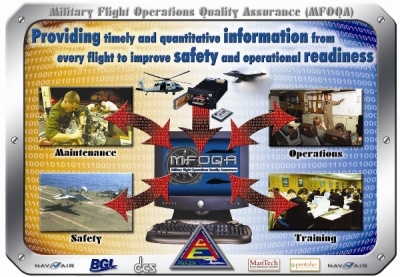
An overview of NAVAIR’s Military Flight Operations Quality Assurance (MFOQA) program. (Source: NAVAIR)
NAVAL AIR SYSTEMS COMMAND, PATUXENT RIVER, Md. (June 6, 2008) – NAVAIR’s Military Flight Operations Quality Assurance (MFOQA) program will accelerate deployment to the rate of one new platform per fiscal year.
The MFOQA program, managed by the Air Combat Electronics Program Office (PMA209), has excellent support from Navy leadership. Mr. Thomas Matthews, the MFOQA Integrated Program Team leader, briefed the MFOQA program to the Secretary of the Navy, the Honorable Donald C. Winter, in early February along with members of the Naval Safety Center and Commander, Naval Air Forces.
“Secretary Winter was very enthusiastic about the MFOQA program,” said Matthews. “He tasked PMA209 to ‘do it right and do it as quickly as possible.’ With SECNAV’s backing, we were able to secure the budget required to accelerate the program.”
The MFOQA program involves the analysis and trending of aircraft flight performance and system data to proactively enhance combat readiness through improvements in operations, maintenance, safety and training functions.
The program provides tools for squadron commanders to establish a baseline for normal operations; to identify, mitigate, and monitor operational risks while detecting precursors to aviation mishaps; and identify operational inefficiencies.
It also provides capabilities to all levels of the Naval Aviation Enterprise to improve and enhance mission-effectiveness through the awareness of abnormal trends, continuous knowledge of aircraft systems performance, and insight into the effectiveness of procedures, policies, and aircrew training on actual mission accomplishment.
The first Navy platforms to fully incorporate the MFOQA program are the F/A-18C-F and the EA-18G communities. “The Hornet has the most mature data collection system,” added Matthews. “Our other platforms are very close to having the same capability. We plan to field MFOQA on all Navy and Marine Corps aircraft, as directed and prioritized by Navy leadership and Commander, Naval Air Forces, at the rate of one platform community per year.”
“MFOQA does not add a new black box on the aircraft, there are no software changes required,” stated W. B. "Chip" Brown, MFOQA Lead Engineer. “The only real requirement is that the platform has a flight recording system such as a mission recorder or a flight data recorder that records applicable data and many platforms already do.”
“MFOQA uses the data that is already routinely being collected on the aircraft, either for mission planning or aircraft maintenance; and a small software patch on the platform's maintenance station, routes that information to the MFOQA site server,” added Brown.
“The MFOQA system is approximately 70 percent commercial-off-the-shelf (COTS) software with the remaining 30 percent Navy "glue" code which integrates the various modules into a single, seamless application,” said Brown. “And due to our competitive acquisition strategy, the Government can use the computer source code to meet platform requirements without having to pay any recurring charges, which will save a lot of money over the life of the program.”
The Department of the Navy (DON) MFOQA program is based in part on the highly successful Federal Aviation Administration (FAA) Flight Operations Quality Assurance program.
While both programs analyze digital flight data routinely downloaded post-flight to measure the safe and efficient operation of the aircraft, the Navy MFOQA program enables aircrew replay of the data for post-mission debriefings, enhanced instrument panel and bit code displays for local maintenance troubleshooting, and access to data at multiple levels within the Naval Aviation Enterprise for sophisticated Fleet trending and analysis.
“The potential benefits include significant improvements in Maintenance, Operations, Safety, and Training (MOST),” said Matthews. “MFOQA will provide a proactive means to highlight positive trends and to identify potential risks in time for corrective action.”
The MFOQA program is managed by the NAVAIR Air Combat Electronics (ACE) Program Office (PMA209). You can learn more about MFOQA by visiting http://pma209.navair.navy.mil/teams/flightOps/mfoqa.asp .
Source: Naval Air Systems Command


